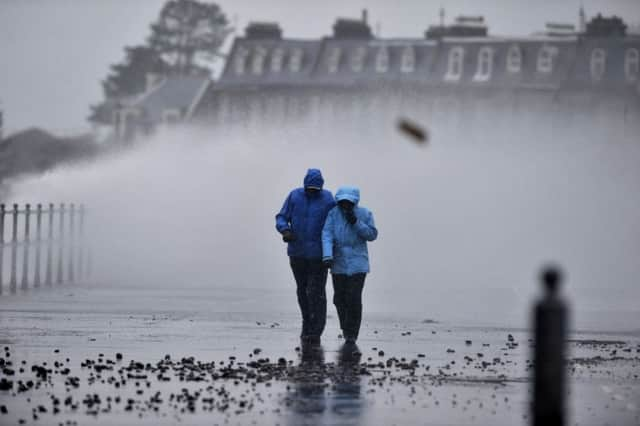Ashley Davies: Scottish hurricane names blow away the rest


Four years ago an intense extratropical cyclone called Friedhelm brought hurricane-force winds to Scotland and other parts of the British Isles. On 8 December, 2011, the strongest winds reached 165mph, necessitating the closure of schools, bridges, roads and numerous businesses, and the ruination of many a high-maintenance hairdo. Trees were uprooted, cars were smashed and, in one comical episode, a bloke filming the storm from his lounge in Fife caught sight of something unexpected rolling past his window. His cries of “Oh my God, trampoline” went viral (the original video has had nearly half a million views on YouTube) and the clip spawned countless memes and even a few remixes.
Those of us who are not students of meteorology might not, however, remember Friedhelm, which was that storm’s official name – chosen by the University of Berlin, which gets to Christen low-pressure systems affecting Europe – because for most of us it was known as Hurricane Bawbag.
Advertisement
Hide AdAdvertisement
Hide AdI like to believe that that choice name was dreamed up by a mischievous former colleague, who certainly played a large part in getting the “Bawbag” hashtag trending when he should have been working, and when we heard it referred to on Radio 4’s Today programme many of us felt disproportionately proud – like when you see your home town on the telly (even it is in conjunction with a report on record levels of teen pregnancies).
I hadn’t realised until this week that hurricane names can be recycled, much in the same way as my family used to re-use beagle names (we had two consecutive Blueys, which does seem worryingly unimaginative, especially as this was not part of one of those elaborate replacing-the-dead-goldfish-type ruses designed to disguise the mortality of a pet).
But if a storm is especially brutal, its name can be retired for ten years. Just as the name Adolf became markedly less popular after the 1940s, it’s unlikely that people will be lobbying for the re-use of Katrina and Mitch any time soon, due to the widespread devastation they caused.
Other hurricane names are permanently “retired”, as is the case with Carol, Connie, Edna and Hazel, Diane, Ione, Janet, Audrey, Gracie, which all visited America in the 1950s. They sure sound like swell gals, but between them they killed more than 9,000 people and wreaked more than $4.41 billion of damage.
Interestingly enough, though, the decision never to use their names again was less to do with the trauma they might trigger than their importance to the research community.
Although big storms were often named after the saint’s day on which they occurred (and still are to an extent, especially when they appear to come out of nowhere), hurricanes first started getting official human names in 1950, the first being Alice. The first masculine name was Bob, in 1979. Small name; huge impact.
As we are rarely visited by hurricanes on this side of the Atlantic, we tend not to give huge storms official human names (the great storm of 1987, for example, is called, er, The Great Storm of 1987), so in September the Met Office and its Irish counterpart Met Eireann launched a project to encourage members of the public to come up with potential names for big weather events that could visit these islands over autumn and winter 2015/16.
The idea was that if people were more involved in the process they’d be more likely to develop a greater awareness and healthy understanding of the weather threats.
Advertisement
Hide AdAdvertisement
Hide AdPeople were encouraged to submit their ideas via Facebook and Twitter, and the Met Office was swamped with suggestions.
So what did they choose? Well, the list included Nigel, Steve and Phil, which (apologies to anyone with these names) sound more like darts team reservists than something that might blow your garage roof off. It’s like buying a bull and calling it Leslie.
The list of storm names chosen for the coming cold season also includes Abigail (I suppose I can see what they were aiming for there – just), Barney, Clodagh, Eva, Frank, Gertrude, Henry, Imogen, Desmond, Jake, Katie, Lawrence, Mary, Orla, Rhonda, Tegan, Vernon and Wendy. The last one’s kind of funny, but I suppose you can’t be too flippant about something that might end up ruining people’s lives.
I don’t know if anyone suggested Gus or Gail (and I get the impression the people at the Met Office are getting a bit bored of being asked about silly suggestions that came in – they’ll only say they got thousands, and they’ll only say they chose “the most popular ones”).
The names will be used in alphabetical order, alternating between male and female, and to comply with US National Hurricane Center naming conventions, storms shouldn’t begin with the letters Q, U, X, Y and Z (simply because not enough names start with these letters).
The Met Office said: “To avoid any confusion over naming, if a storm is the remnants of a tropical storm or hurricane that has moved across the Atlantic, the already established method of referring to it as, eg, ‘Ex-hurricane X’ will continue.”
I wish we in Scotland had been given a chance to name future storms because we know how to respond to disrespect shown to us by bad weather. I took to social media to find out what people I know would go for, and the suggestions knock Nigel, Steve and Phil into a cocked hat.
My favourite was “Hunners o’ Wind”, followed by Hurricane Radge, Hurricane Bampot and Tropical Storm Mince. A respected arts and political commentator suggested Hurricane Oor Wullie if it was a small one, or Hurricane Begbie if it was particularly brutal. I rather liked Cyclone Numptie and Hurricane Higgins too.
Somebody else came up with a name typical of Scottish resilience, though perhaps a bit long: “It’s not a hurricane. It’s just a bit blowy ootside.”